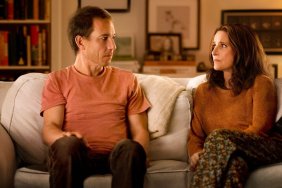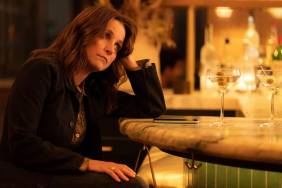Cast:
Julia Louis-Dreyfus as Eva
James Gandolfini as Albert
Catherine Keener as Marianne
Toni Collette as Sarah
Ben Falcone as Will
Tracey Fairaway as Ellen
Kathleen Rose Perkins as Fran
Tavi Gevinson as Chloe
Amy Landecker as Debbie
Michaela Watkins as Hillary
Toby Huss as Peter
Anjelah Johnson-Reyes as Cathy
Directed by Nicole Holofcener
Story:
Eva (Julia Louis-Dreyfus) is a massage therapist and a single mother ready to see her daughter head off to college, leaving her alone. At a party, she meets Albert (James Gandolfini), a single father also sending his daughter off to school. The two go out as Eva tries to deal with dating once again. At the same time, she meets a poet named Marianne (Catherine Keener) who hires her as a masseuse, the two bonding and becoming friends, but Marianne starts to make Eva rethink her attraction to Albert the more Marianne badmouths her ex-husband.
Analysis:
Three years after her last movie “Please Give,” Nicole Holofcener returns with a film that’s no less rambling than some of her earlier films, but also one that’s far more accessible and relatable for audiences, especially those of a certain age.
Eva is a working single mother dealing with the day-to-day stress of massaging rich and entitled white people while trying to connect with her teenager daughter who is about to head off to Sarah Lawrence College. When she meets James Gandolfini’s Albert at a party, the attraction isn’t mutual, but Eva’s interested enough to go out with him and their relationship grows quickly over time as he proves to be a warm and funny guy.
“Enough Said,” at its core, can easily be labelled as a romantic comedy, but Holofcener tends to keep the laughs and the romance elements as two separate things, spending much of the first half avoiding traditional story structure with a series of vignettes showing Eva’s encounters with various characters. When she’s not on a date with Albert, we see Eva interacting with her daughter or her best friend played by Toni Collette or her latest client Marianne (Catherine Keener), each of these scenes allowing Holofcener to make wry commentary on modern life and relationships, while not necessarily contributing to the story as much. During her biggest moment of crises, Eva also ends up befriending her daughter’s best friend Chloe, played by Tavi Gevinson, who bares an eerie resemblance to a young Michelle Williams, but it’s her time with Marianne, who is constantly badmouthing her ex-husband that has the most effect on Eva as she starts to question her relationship with Albert.
It’s immediately obvious a movie like this probably wouldn’t work without someone like Julia Louis-Dreyfus in the role of Eva. There are a few moments when it’s hard not to be reminded of her comedies of error as Elayne on “Seinfeld,” especially once she starts to realize the connection between Marianne and Albert. Despite the familiarity of the character, Louis-Dreyfus clearly understands the character Holofcener was trying to create in Eva, using her presumably to channel the filmmaker’s own mid-life crisis thoughts on dating and motherhood.
For one of his final roles, Gandolfini is allowed to show his softer and more sensitive side as a schlubby guy you can’t help but root for even, as we see Eva’s mind being changed about him to the point where she eventually starts to sabotage the relationship. When a stunning revelation makes it seem like the relationship might not work out between them, it’s fairly heartbreaking, but it’s to Holofcener’s credit that she makes Eva’s character more flawed rather than the normal female-written rom-com practice of making it the guy’s fault.
To be honest, Catherine Keener probably could have taken the role of Eva, having starred in all of Holofcener’s previous films, but putting her in the smaller supporting role as Marianne was a wiser move even if it’s not a very flashy role since she’s a good counterpoint to Julia-Dreyfus. The same can be said for Collette who doesn’t have a lot of heavy lifting but has some fun moments with “Bridesmaids’” Ben Falcone as a couple whose back-and-forth barbs give Holofcener an opportune chance to comment on marriage.
While the central romance between Eva and Albert is resolved in a fairly satisfying way, some of the other relationships aren’tthe relationship Eva nurtures with her daughter’s friend ends abruptly and is never mentioned again, making you wonder why it was included.
The Bottom Line:
What “Enough Said” lacks in structured storytelling it more than makes up for in emotional warmth and heart with Holofcener’s best script to date and performances by Louis-Dreyfus and Gandolfini that make it one of her most enjoyable films.










